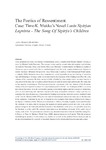Mostrar o rexistro simple do ítem
The poetics of ressentiment. Case: Timo K. Mukka's novel Laulu Spirjan Lapsista - The Song of Sipirja's Children
| dc.contributor.author | Martinen, Leena Makela | es_ES |
| dc.date.accessioned | 2014-10-02T12:32:00Z | |
| dc.date.available | 2014-10-02T12:32:00Z | |
| dc.date.issued | 2012 | es_ES |
| dc.identifier.citation | Culture of communication / Communication of culture, 2012: 1589-1596. ISBN: 978-84-9749-522-6 | es_ES |
| dc.identifier.isbn | 978-84-9749-522-6 | es_ES |
| dc.identifier.uri | http://hdl.handle.net/2183/13454 | |
| dc.description.abstract | [Abstract] In my presentation I study the concept of ressentiment, witch is adapted from Mikhail Bakhtin´s theory of novel by Michael André Bernstein. The concept is also used by several other philosophers and scholars, for example Nietzsche, Freud and Girard. How ever, Bernstein´s interpretation for Bakhtin´s studies of Dostoevsky gives useful and effective methodological tool for study certain characteristic features in modern literature. Bernstein brings to the focus Dostoevsky´s analyze from Underground ManZ a(piski iz podpolj, 1864). Bernstein shows how ressentiment, which is possible to see as a feeling of powerless rage and dreaming of revenge, works in the mind and in the discourse of the Underground Man. He is the prisoner of his memories. He feels that he is badly offended by other people and at the same time he is very proud of his idea that he is above others because of what he knows and understands. He thinks that he has superior consciousness. This hypersensitiveness is presented with fine nuances of his discourse, mainly in his inner speech but also in his conversations with his friend Liza. Underground Man´s situation and attitude has also a lot to do with modern parody, mock-heroic aspects and the concept of melancholy, which is also interesting and important concept in the study of (modern) literature. I show with few text examples, first from Dostoevsky´s Notes from the Underground and then from the novel of modern Finnish writer Timo K. Mukka (1944-1973), how the state of ressentiment works in the story and in the discourse of the characters. I translate by my self in English the text examples from Mukka´s ballad novel Song of the Sipirja´s Children (1966). The novel is translated in Hebrew, Swedish, Lappish, Czech and Estonian. My attention is to show, that by studying the nuances of speech genres (which has a lot to do with the generic change in the literature) and the discourse of the characters in the novel, it is possible study how the literature is in the world. By studying these aspects we are dealing with study of the world view of literary work of art. This presentation is based on my doctoral dissertation I am the Land Beckoning You: A Poetics of Timo K. Mukka´s World View (2008, doctoral thesis are in Finnish). With the presented methodological apparatus I will continue my studies in the field of the modern Finnish literature and the artistic representations for example of traumatic features in the relationship between man and woman. | es_ES |
| dc.language.iso | eng | es_ES |
| dc.publisher | Universidade da Coruña | es_ES |
| dc.title | The poetics of ressentiment. Case: Timo K. Mukka's novel Laulu Spirjan Lapsista - The Song of Sipirja's Children | es_ES |
| dc.type | info:eu-repo/semantics/conferenceObject | es_ES |
| dc.rights.access | info:eu-repo/semantics/openAccess | es_ES |






